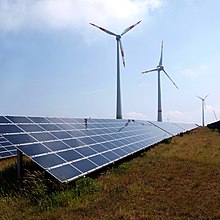User:RobbieIanMorrison/sandbox/energiewende


The Energiewende (German for energy transition) is the transition by Germany to a low carbon, environmentally sound, reliable, and affordable energy supply.[2] The new system will rely heavily on renewable energy (particularly wind, photovoltaics, and biomass) energy efficiency, and energy demand management. Most if not all existing coal-fired generation will need to be retired.[3] The phase-out of Germany's fleet of nuclear reactors, to be complete by 2022, is a key part of the program.[4]
Legislative support for the Energiewende was passed in late 2010 and includes greenhouse gas (GHG) reductions of 80–95% by 2050 (relative to 1990) and a renewable energy target of 60% by 2050. These targets are ambitious.[5] One Berlin policy institute noted that "while the German approach is not unique worldwide, the speed and scope of the Energiewende are exceptional".[6] The Energiewende also seeks a greater transparency in relation to national energy policy formation.[7]
Germany has made significant progress on its GHG emissions reduction target, achieving a 27% decrease between 1990 and 2014. However Germany will need to maintain an average GHG emissions abatement rate of 3.5% per annum to reach its Energiewende goal, equal to the maximum historical value thus far.[8]
Germany spends €1.5 billion per annum on energy research (2013 figure) in an effort to solve the technical and social issues raised by the transition.[9] This includes a number of computer studies that have confirmed the feasibility and a similar cost (relative to business-as-usual and given that carbon is adequately priced) of the Energiewende.
The term Energiewende is regularly used in English language publications without being translated (a loanword).
References[edit]
- ^ Germany's Electricity Mix 2014
- ^ Federal Ministry of Economics and Technology (BMWi); Federal Ministry for the Environment, Nature Conservation and Nuclear Safety (BMU) (28 September 2010). Energy concept for an environmentally sound, reliable and affordable energy supply (PDF). Berlin, Germany: Federal Ministry of Economics and Technology (BMWi). Retrieved 1 May 2016.
- ^ acatech; Lepoldina; Akademienunion, eds. (2016). Flexibility concepts for the German power supply in 2050: ensuring stability in the age of renewable energies (PDF). Berlin, Germany: acatech — National Academy of Science and Engineering. ISBN 978-3-8047-3549-1. Retrieved 28 April 2016.
- ^ Bruninx, "Kenneth; Madzharov, Darin; Delarue, Erik; D'haeseleer, William (2013). "Impact of the German nuclear phase-out on Europe's electricity generation — a comprehensive study". Energy Policy. 60: 251–261. doi:10.1016/j.enpol.2013.05.026. Retrieved 12 May 2016.
- ^ Buchan, David (June 2012). The Energiewende — Germany's gamble (PDF). Oxford, UK: Oxford Institute for Energy Studies. ISBN 978-1-907555-52-7. Retrieved 12 May 2016.
- ^ Agora Energiewende (2015). Understanding the Energiewende: FAQ on the ongoing transition of the German power system (PDF). Berlin, Germany: Agora Energiewende. Retrieved 29 April 2016.
- ^ acatech; Lepoldina; Akademienunion, eds. (2016). Consulting with energy scenarios: requirements for scientific policy advice (PDF). Berlin, Germany: acatech — National Academy of Science and Engineering. ISBN 978-3-8047-3550-7. Retrieved 28 April 2016.
- ^ Hillebrandt, Katharina; et al., eds. (2015). Pathways to deep decarbonization in Germany (PDF). Sustainable Development Solutions Network (SDSN) and Institute for Sustainable Development and International Relations (IDDRI). Retrieved 28 April 2016.
- ^ Quirin Schiermeier (10 April 2013). "Renewable power: Germany's energy gamble: an ambitious plan to slash greenhouse-gas emissions must clear some high technical and economic hurdles". Nature. doi:10.1038/496156a. Retrieved 1 May 2016.
